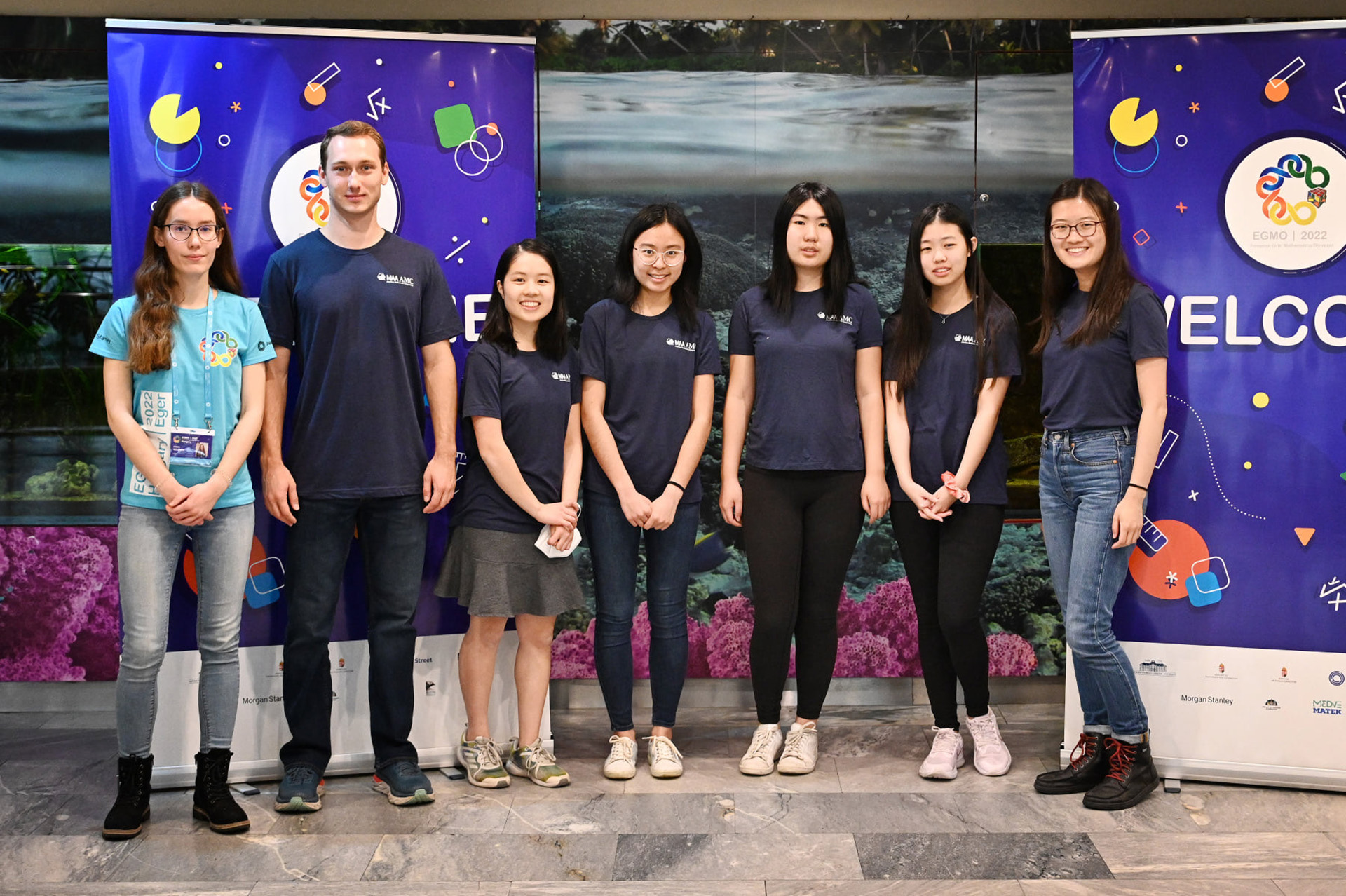Rudenko Coaches U.S. Girls Team to First in International Math Competition
As a high school student in Ukraine, competitive mathematics puzzled Oleksandr "Alex" Rudenko. A top competitor, he would go back and read the solutions to challenging problems he was unable to solve.
"Some of the solutions would surprise me so I would go back to understand how one can come up with a solution or idea. I would ask my friends and our instructors, and I would spend a lot of time thinking about those as well," he said. "So, when I graduated from high school, I decided to start coaching students to think in a way that unravels those hidden connections inside problems."
When Rudenko moved to Pittsburgh to start his doctoral program in algorithms, combinatorics and optimization (ACO) at Carnegie Mellon University, he brought his coaching skills with him.
Rudenko recently returned from Hungary and the 11th European Girls' Mathematical Olympiad. He served as the U.S. team leader along with deputy leader Rachel Zhang. Together they coached Kaylee Ji, 16; Vivian Loh, 15; Jessica Wan, 15; and Isabella Zhu, 16.
The U.S. team took first place. Individually, Loh, Wan and Zhu were awarded gold medals and Ji earned silver.
Loh is the daughter of CMU Mathematical Sciences Professor Po-Shen Loh, who introduced Rudenko to CMU after meeting him at an international competition. At the time, Rudenko was coaching the Ukrainian team.
"Po-Shen Loh was the leader of the U.S. team and just an amazing person," Rudenko said. "He was the one who told me everything about ACO and was the reason I applied. I think that was such a miracle and I'm very, very grateful for that."

A volunteer at the European Girls' Mathematical Olympiad stands with (from left) Alex Rudenko, Vivian Loh, Isabella Zhu, Kaylee Ji, Jessica Wan and Rachel Zhang.
In the six years that Rudenko has been in Pittsburgh, he has coached local middle school and high school students as well as worked with Loh to coach the U.S. International Mathematical Olympiad (IMO) team. He also helped train U.S. and international high school students as part of the Mathematical Association of America's Mathematical Olympiad Summer Program at CMU. Under Loh's guidance, the U.S. have placed first four times since 2015. Rudenko has been part of that effort.
"I think that he brings very clearly a strong intellectual ability," Loh said. "On top of that he brings the ability to inspire younger people to want to get into the field, and this is a wonderful combination."
Prior to traveling to Hungary, Rudenko defended his doctoral thesis in early April. ACO is an interdisciplinary Ph.D. program administered jointly by the Operations Research group in the Tepper School of Business, the Computer Science Department in the School of Computer Science and the Department of Mathematical Sciences in the Mellon College of Science.
"Even though these problems look very similar, the minor differences that define the problems make each problem so different that they require separate ways to approach," he said. "I've also done mathematical modeling of interactions between firms and consumers to figure out how to reach an equilibrium and also shift it so that everyone is better off."
R. Ravi, the Andris A. Zoltners Professor of Business, advised Rudenko.
"In his doctoral work, Alex brought creative ideas from optimization to design algorithms for problems in spreading information in networks quickly, designing layered logistics networks with economies of scale across the layers, and also modeling and explaining the response of firms to tech-savvy customers in the marketplace. In the other direction, using these applications to create new models in optimization, he was able to generalize some of these methods to more abstract settings. In this way, his thesis is a nice example of interdisciplinary work in discrete mathematics, optimization, algorithms and marketing."
After graduation, Rudenko said he is looking for a role in information technology or finance.
"Both look exciting to me. One of my main preferences is to find a community of people similar to CMU — one that is smart, open-minded and collaborative," he said.
While coaching and wrapping up his doctoral studies, Rudenko has been doing this against the backdrop of the Russia-Ukraine war. Family and the people around him are extremely important, Rudenko said. As Russia's invasion continues, he said he is happy that his sister and parents are safely in the U.S.
"But a lot of my relatives and close friends are still in Kyiv," he said, adding that he uses any opportunity to explain Russia's actions to people around him. "I talk to my grandparents every day, and even though I know what's happening there, I don't think anyone who lives in the U.S. can fully imagine how it is. The [Russian government] massively bombing the residential areas and killing civilians, they want to destroy us and commit genocide."
Rudenko said he hopes that U.S.' and EU's multifunctional support will lead to an end to these atrocities in his birth country and allow it to flourish again.
For Rudenko studying mathematics adds up to a well-lived life.
"I was always very fascinated about using mathematical tools and mathematical thinking to make lives of people in general better," Rudenko said. "CMU is one of the best places to connect math to a variety of applied disciplines."
He said that in learning mathematics, one also learns how to apply critical thinking to consider many situations in life from new angles.
"That skill is very exciting because you use it every single day no matter what your profession is," he said.